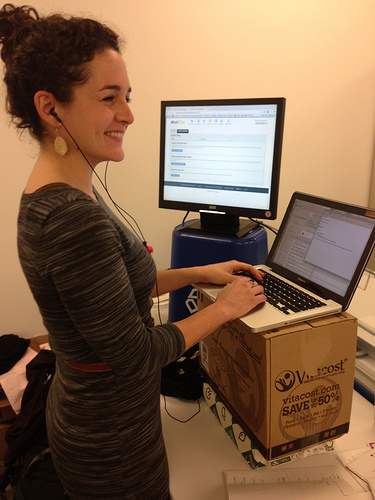. July 18, 2013—Portland City Commissioner Steve Novick has gained a reputation for having a rare ability to combine jocular cheekiness with serious, wonky policy issues. That was on full display yesterday when the Portland City Council proclaimed it as “Stand Up for Workplace Wellness Day,” a proclamation Novick spearheaded.
July 18, 2013—Portland City Commissioner Steve Novick has gained a reputation for having a rare ability to combine jocular cheekiness with serious, wonky policy issues. That was on full display yesterday when the Portland City Council proclaimed it as “Stand Up for Workplace Wellness Day,” a proclamation Novick spearheaded.
The purpose of the proclamation is to highlight increasing amounts of research showing that prolonged periods of sitting can have some pretty serious health effects—including obesity, increased blood pressure, high blood sugar, diabetes, excess body fat, and high cholesterol levels. A November 2012 study, published in the journal Diabetologia, analyzed the results of 18 studies on the health effects of prolonged sitting, and found that the risk of contracting any of those conditions increases by at least 50 percent.
Studies also show that moderate to vigorous exercise a few times a week does not offset the effects of sitting for hours at a time.
“Chairs are quickly becoming the cigarettes of the 21st century,” Novick said during the city council meeting.
Mary Lou Heinrich, the outgoing director of the Oregon Public Health Institute, Liz Baxter, its incoming director who chairs the state’s health insurance exchange, and Claire Wheeler, an adjunct professor of community health at Portland State University, testified about the health impacts of sitting.
Heinrich said that various cultural and technological advances, such as increased transportation options to places people would walk to, not having to stand and wash dishes by hand, and the popularity of video and computer games have caused people to be less active.
“Little by little, every day, we have all become so much more sedentary,” Heinrich said.
The speakers said employees could be encouraged to use stairs instead of elevators, stand while taking phone calls, and look for other opportunities to not sit for hours at a time.
In an interview with The Lund Report after the meeting, Novick—who was standing—said he wanted to call attention to sitting’s health effects, but probably won’t push for any new programs, funding for office supplies such as adjustable desks, or other workplace policies.
“It seemed like something worth speaking out on,” he said. “I think it’s actually a really important message for employers to deliver. Keeping yourself well doesn’t have to be part of a formal program.”
Novick plans to encourage the directors of the bureaus he oversees to educate their employees. The Portland Office of Emergency Management, which includes the city’s 911 operators, already has adjustable desks that allow employees to either sit or stand.
Work place wellness initiatives, which encourage employees to adopt healthy behaviors, are increasingly popular. Intel has a wellness program that the Public Employees Benefit Board, the group that oversees the health benefits of state workers, used as a model when it developed its wellness program, and the state’s Public Health Division launched its Wellness@Work program last year in Oregon schools and other state workplaces.
“Employers are beginning to realize how huge a cost [that] are healthcare costs,” Novick said.
City healthcare costs is an issue Novick discussed during his election campaign, and he has advocated for funding bicycle transportation, and reducing costs by focusing on preventive care and creating programs that provide effective treatment to city employees who frequently use the healthcare system.
Image for this story by Wayan Vota (CC BY-NC-SA 2.0) via Flickr.
Amanda Waldroupe can be reached at [email protected].